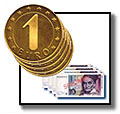Tax Hole Threatens German EMU Hopes
Germany's drive to qualify for a single European currency has suffered a big blow after the Government's tax revenue forecast for this year showed a short-fall of DM18 billion, (£7 billion).
The shrinking tax income is mainly due to record levels of unemployment, as well as a lack-lustre economic recovery.
The figures will make it much harder for Germany to bring its budget deficit down to the limits allowed for entry to the planned European Monetary Union in 1999.
The shortfall tears a huge hole in the budget during the year member states will be judged for qualifying for the European Union's economic and monetary union.
The German Finance Minister, Theo Waigel, said the revenue shortfall won't "fundamentally" alter Germany's chances for being among the first countries to join the European currency union, which is to be launched on Jan. 1, 1999.
He insisted the government was determined to keep on course for monetary union. But he has also promised not to raise taxes.
Mr Waigel will almost certainly be forced to announce an emergency savings package, including a budget freeze.
He may also have to raise Government borrowing, while an early sell-off of the Government's stake in the national telephone company is also being considered.
The shortfall in tax income means the German Government is facing the most severe test of its political will to join a singel currency to date.
Countries wishing to be members of the currency club must fulfill a number of criteria. Among them is that a nation's budget
deficit not exceed 3% of gross domestic product.
Members of the currency union will be chosen next year, based on their economic performance for 1997.
Convergence rules
|

